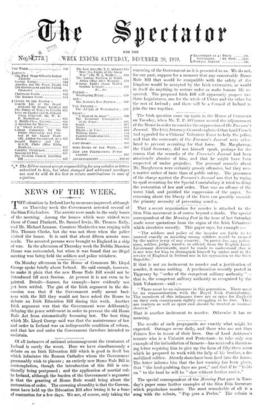The Irish question came up again in the House of
Commons on Tuesday, When Mr. T. P. O'Connor moved the adjournment of the House in order to consider the suppression of tfie Freeman's Journal. The lrish Attorney-General explained that Lord French had appealed for a Citizens' Volunteer Force to help the police, and that the comments of the Freeman's Journal were calcu- lated to prevent recruiting for that force. Mr. Macpherson, the Chief Secretary, did not himself speak, perhaps for the reason that the remarks of the Freeman's Journal had been atrociously abusive of him, and that he might have been suspected of undue prejudice. The personal remarks about Mr. Macpherson were certainly grossly offensive, but they wen, a matter rather of taste than of public safety. The gravamen of the charge against the Freeman's Journal was that by trying to spoil recruiting for the Special Constabulary it tried to delay the restoration of law and order. That was an offence of the worst kind, and justified the suppression of the paper. No reasoning about the liberty of the _Press can possibly override the primary necessity of preventing murder.






































